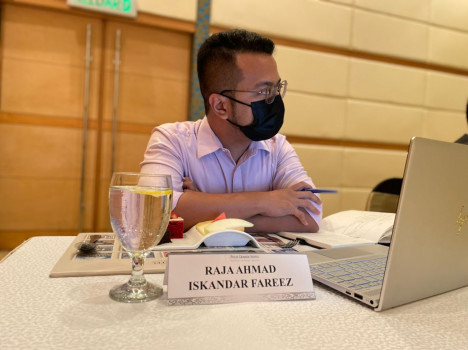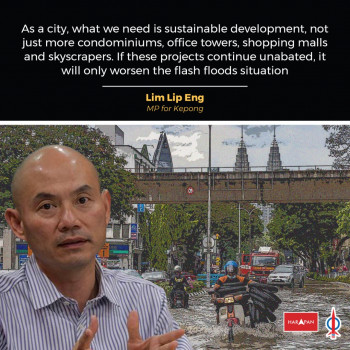In this research piece, Serdang MP Ong Kian Ming uncovers another dubious distinction for Malaysia- one of the most malapportioned countries in the world. He makes a comparison with other countries and debunks yet another myth fostered by the Election Commission and BN federal government about Malaysia’s alleged fairness of election.
Prime Minister Najib has said that he wants to make Malaysia into the world’s best democracy as part of his Political Transformation Program. If he is serious in his intent, he must make a commitment to the ‘one-man-one-vote’ principle in order to reverse Malaysia’s position as one of the most malapportioned countries in the world.
Malapportionment is a measure of inequality in the distribution of voters among the seats in a country. Political scientists have devised a mathematical formula which measures the level of malapportionment in a country.[1] If there is no malapportionment in a country’s electoral system – if every seat has the same number of voters – the value of this measurement will be zero.
Table 1 below shows the level of malapportionment in 25 countries which use the First-Past-The-Post electoral system. Malaysia is ranked 21st out of 25th with a malapportionment measure of 0.173.
Table 1: Measure of malapportionment in First Past the Post Countries
| No. | Countries | Malapportionment rate | Year of Election |
|
1 |
United States |
0.014 |
2010 |
|
2 |
Trinidad & Tobago |
0.027 |
2010 |
|
3 |
Australia |
0.030 |
2010 |
|
4 |
United Kingdom |
0.041 |
2010 |
|
5 |
Tanzania |
0.078 |
2010 |
|
6 |
Canada |
0.083 |
2011 |
|
7 |
Bangladesh |
0.083 |
2008 |
|
8 |
Jamaica |
0.085 |
2011 |
|
9 |
Pakistan |
0.085 |
2013 |
|
10 |
Botswana |
0.087 |
2009 |
|
11 |
Belize |
0.096 |
2012 |
|
12 |
Bahamas |
0.107 |
2012 |
|
13 |
Sierra Leone |
0.108 |
2012 |
|
14 |
India |
0.129 |
2009 |
|
15 |
St. Lucia |
0.130 |
2011 |
|
16 |
Samoa |
0.137 |
2011 |
|
17 |
Bhutan |
0.139 |
2013 |
|
18 |
Malawi |
0.154 |
2009 |
|
19 |
Antigua and Barbuda |
0.166 |
2009 |
|
20 |
Uganda |
0.172 |
2011 |
|
21 |
Malaysia |
0.173 |
2013 |
|
22 |
Kenya |
0.175 |
2013 |
|
23 |
Ghana |
0.181 |
2012 |
|
24 |
Zambia |
0.190 |
2011 |
|
25 |
Solomon Islands |
0.239 |
2010 |
The advanced democracies of the United States (0.014), Australia (0.03), the United Kingdom (0.041), and Canada (0.083) have malapportionment measures which are far below Malaysia’s. Malaysia has a higher level of malapportionment compared to Bangladesh (0.083), Pakistan (0.085) and India (0.129).
The reason why the United States, Australia, the United Kingdom and Canada have lower levels of malapportionment compared to Malaysia is that they all have rules which limit the maximum amount of deviation allowed for in each individual constituency.
In the United Kingdom, the Parliamentary Voting System and Constituencies Act 2011 sets a 5% limit above or below the national quota.[2] In Australia, the Commonwealth Electoral Act 1918 sets a 3.5% limit above or below a state’s electoral quota.[3]
In Canada, the Electoral Boundaries Readjustment Act, Section 15 (2) sets a 25% above or below a province’s electoral quota.[4] In the United States, various Supreme Court decisions made it mandatory for population in each congressional district to be roughly equal so as to respect the one-man-one-vote principle.[5]
If Prime Minister Najib is sincere in wanting to make Malaysia into the world’s best democracy, he can start by following the example of these advanced democracies by respecting the one-man-one-vote principle. He can do so by referring to the 15% maximum deviation rule for each state’s electorate quota that was recommended by the Reid Commission.
To ensure that malapportionment in Malaysia is decreased to a level which is consistent with being the ‘world’s best democracy’, Prime Minister Najib should also establish a Parliamentary Select Committee to specifically oversee the next delimitation (or delineation) exercise which the Election Commission has announced will commence at the end of the year.
To ensure that this Parliamentary Select Committee will prioritize the one-man-one-vote principle, Prime Minister Najib should also appoint an opposition Member of Parliament as the Chairman of this Committee.
If he fails to commit to ensuring a fair and equitable delimitation exercise, it is another sign that all his talk about political transformation and wanting to make Malaysia’s the world’s best democracy is merely empty talk without any substantive action to back it up.
The fact that almost all of the recommendations of the Parliamentary Select Committee on Electoral Reform have not been implemented is a strong reminder of the lack of commitment on the part of the Prime Minister to introduce serious electoral reform in the country.
Note: A national quota is calculated by dividing the total number of voters nationally with the total number of seats – in other words, the average number of voters per seat. A state quota is the average number of voters per seat for a state.
[1] http://www.polisci.umn.edu/~dsamuels/BJPS2001.pdf David Samuels and Richard Snyder, ‘The Value of a Vote: Malapportionment in Comparative Perspective’, British Journal of Political Science 31, 2011, pp.651-671, Cambridge University Press, United Kingdom[2] http://www.legislation.gov.uk/ukpga/2011/1/part/2/enacted
[3] http://www.comlaw.gov.au/Details/C2013C00165/Html/Text#_Toc355768167
[4] http://laws-lois.justice.gc.ca/eng/acts/E-3/FullText.html
[5] http://aceproject.org/ace-en/topics/bd/bdy/bdy_us/





Hi! I am doing my project on GE13. I would wish to know how to obtain the information regarding the mal-apportionment. Many thanks if my question could be answer.